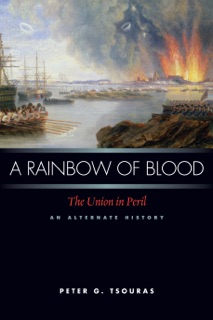“Do you know what military glory is? It is ‘that attractive rainbow, that rises in showers of blood—that serpent’s eye, that charms to destroy.’” —Abraham Lincoln
The Union in dire peril! The war that began in Peter G. Tsouras’s previous alternate history, Britannia’s Fist, accelerates during a few desperate weeks in October 1863. From the bayous of Louisiana to the green hills of the Hudson Valley, from Chicago in flames to the gates of Washington itself, the Great War uncoils in ropes of fire. French and British armies are on the march, and heavy reinforcements have put to sea. Copperheads have risen in revolt to drag the Midwest into the Confederacy as a vital Union army stands starving and under siege in Tennessee. Meanwhile, Robert E. Lee and the Royal Navy set in motion a stroke that is boldness itself. The Union staggers under these blows.
While the Grenadier Guards march into glory in upstate New York’s apple orchards, from the second story of a shot-up Washington hotel Abraham Lincoln watches a forest of the red flags of rebellion waving over a Confederate column rushing across the Long Bridge. To stop them is a war-worn regiment of New York soldiers. To their backs Washington burns. But new technologies and the art of intelligence are thrown onto the scales, while Russia plans to enter the war to avenge its humiliation in the Crimean War.
A Rainbow of Blood brings forward the Great War from its outbreak to the first great crisis of the embattled republic. Peopled with remarkable personalities of the age, the book rattles with the tramp of armies marching down one of the most intriguing roads not taken—or even imagined—until now.




















